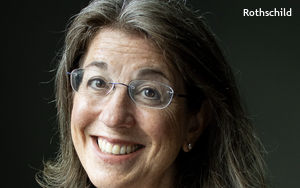
Cage free? Free range? Farm
Fresh? While 90% of Americans buy and eat eggs, that doesn’t mean they can decipher the misleading buzzwords used to sell them. A new ad campaign from Nellie’s Free Range Eggs, themed
“Life’s Better Out Here,” aims to educate egg shoppers, explaining the importance of eggs that are “certified
humane.” The ads feature children allowed to let their bodies (and imaginations) run free outdoors, drawing parallels to how the brand believes hens should live. Phyllis Rothschild, chief
marketing officer at Pete & Gerry’s, which owns Nellie’s, tells CPG Insider why this matters.
Interview has been edited for length and clarity.
CPG Insider: Tell us about Pete & Gerry’s egg portfolio.
advertisement
advertisement
Phyllis Rothschild: Pete & Gerry's started about 30 years ago. We were the first “Humane
Certified” and B-Corp egg company. Nellie’s is the gateway into premium eggs, and Pete & Gerry’s Organic Free Range is our organic line, and then we have Pete & Gerry’s
Pasture-Raised. With those three lines, we run the full spectrum of the premium egg consumer.
CPG Insider: How well do consumers understand those distinctions?
Rothschild: Not well. Our research shows deep confusion. The biggest challenge is the distinction between free-range and cage-free. Eggs from caged hens make up the majority of eggs sold in
the U.S. Hens are crammed into tiny cages where they cannot move. They just lay eggs all day. “Cage-free” sounds great, but those hens rarely see the outdoors. They're overcrowded into
large industrial structures. I wouldn’t even call them barns. In some cases, there’s less than one square foot of space per hen.
Free-range, which applies to many of our eggs,
means hens have outdoor space and access. They live the way chickens love to live -- outside, taking dust baths, eating lots of bugs and worms, enjoying the sunshine and getting extra vitamin D. That
creates those hard shells and bright yellow-orange yolks.
Pasture-raised is the most luxurious lifestyle for the hens. They have outdoor access up to 108 square feet per hen.
While we
are all for the legislation that's happening across the U.S. in terms of requiring at least a cage-free life, for the welfare of hens, we still believe in doing better, driving toward free-range and
pasture-raised.
CPG Insider: Which egg type is growing fastest?
Rothschild: The premium category is growing much more rapidly than the other categories, especially with
the legislative trends. The “cage-free plus” category is growing more quickly. And for us, the Nellie’s and Pete & Gerry's businesses are roughly equivalent. Nellie’s is
the largest free-range egg brand in the U.S., and Pete & Gerry's Organic is the largest organic free-range brand. We just launched pasture-raised last year, so we're catching up, but we're the No.
2 pasture-raised brand.
CPG Insider: Many consumers don’t care much about hens. They buy “better” eggs because they think they provide better nutrition. Are your
customers more motivated by human health? Or hen welfare?
Rothschild: Our segmentation analysis shows there are three types of consumers. There's a group that is all about hen welfare,
and they want to make sure that the hens get the best possible treatment. They want transparency. That tends to be the motivation for people who choose pasture-raised eggs.
Another consumer
focuses on wellness and nutrition and tends to be the organic buyer. Her family consumes a lot of eggs, and she wants those eggs to be the healthiest.

CPG Insider: Tell us about the new campaign.
Rothschild: This is a pivotal moment for the Nellies Free Range brand. We’re super excited about the new “Life is better out here” campaign. It allows us to tell the story
about why “free-range” is better and why “cage-free” shouldn’t be considered on an equal plane. It also points out that children, like hens, are meant to spend time
outdoors. Chickens are supposed to spread their wings in the sunshine, and so are we.
CPG Insider: What’s the media strategy?
Rothschild: Connected TV, YouTube,
Meta, Pinterest. We’re targeting markets where Nellie’s has the most significant distribution. And we’re going after consumers who care about hen welfare, accessible price points,
and health and wellness.
CPG Insider: Speaking of price, the cost of eggs soared last year and became the focal point of many inflation stories. How does that impact sales?
Rothschild: Lots of food prices increased, but eggs got a double whammy, hit first by the rising cost of grain and then avian influenza. The resulting shortage drove up egg prices especially
at the commodity egg level. In some ways, it wasn’t a bad thing for us. We managed to stay consistent, as lower-quality eggs raised their prices. As the price gap closed, more consumers paused
to reconsider. They said, “If I’m going to spend more per dozen, is it worth it to step up the quality?” Many entered the premium category as a result.
Also, it’s worth
pointing out that an egg is still very cheap relative to any other protein category. You can feed a family of four a meal made from a dozen eggs. We think that the more consumers learn about hen
welfare and egg quality, the more willing they will be to pay for a premium product.
CPG Insider: Has the popularity of veganism hurt egg sales?
Rothschild: The
consistency of egg purchases hasn't changed much over the years. People tend to continue to buy a consistent number of eggs per year. Something that has helped is the recent FDA ruling that eggs can
be called “healthy.” We were the first brand to put “healthy” on our cartons. And it’s our corporate tagline: “Healthy hens, healthy eggs, healthy
planet.”